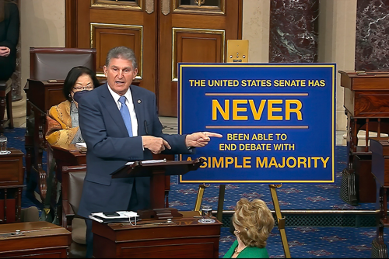
In a perfect world winners win, losers lose. It’s clean, simple and beyond dispute. There is no confusion. But that’s not the world we live in. In a rational orderly world, disputes arise and are settled in a rational orderly way. Since the turn of the 21st century that’s been the exception rather than the rule. On the streets of America, disputes are being settled with guns. Extreme right-wing factions hold seats in Congress. Philosophical differences are met with rigid hostility. Positions have hardened, and compromise is regarded as weakness. Good faith and the common good are antiquated ideas. Gridlock is the norm. Frustration and anger are common currency in the halls of Congress.
It’s difficult in any discussion of American democracy not to cite Churchill’s dictum that –
‘Many forms of Government have been tried and will be tried in this world of sin and woe. No one pretends that democracy is perfect or all-wise. Indeed, it has been said that democracy is the worst form of Government except for all those other forms that have been tried from time to time.…’
American democracy, we are told repeatedly, is an experiment. There have always been political differences, but there have been periods where established rules and behavioral norms provided a template for dispute resolution. As a former lawyer/mediator/arbitrator I was schooled to listen first and talk later.
Now, with a 50-50 party split in the Senate and the likelihood Democrats will lose seats in the upcoming midterms, frustration is fueling a rising tide to eliminate that pesky procedural obstacle called the filibuster. There are so many bills – voting rights, infrastructure, childcare, paid leave, child tax credit, climate change, gun control – awaiting Senate action but they are being blocked by Republican opposition. Their tool is the filibuster, and its use prevents a simple majority from passing legislation. The only way around it is a 2/3 vote for “cloture” i.e. a vote to end debate and proceed to a vote.
Both houses of Congress are dysfunctional. Republicans are committed to stonewalling all of President Biden’s initiatives, while House Democrats fiddle over “progressive” versus “moderate” agendas while Rome burns. Unable to modify their own positions to support their own president’s sweeping Build Back Better Bill (stupid name) while at the same time two Democrats in the Senate have stolen the headlines by denying the president his bill. They all look like elementary school kids squabbling on the playground as the tornado approaches.
It’s not simple, but here are Jack’s Notes on the filibuster: The US Constitution recognized that there were certain situations that required more than a simple majority to achieve a convincing consensus in support of an action. Impeachment. Expelling a member of Congress. Overriding a presidential veto. Ratifying treaties, and proposing constitutional amendments were explicitly listed as requiring a super-majority (2/3) vote. Some required it of the Senate only, and some required it of both Houses. Alexander Hamilton argued against it in The Federalist. Aaron Burr, his nemesis, thought it necessary in certain situations to develop a super-consensus.
The name comes from a Dutch word meaning “pirate” and suggests its use takes something unfairly. Implementation of the procedure is governed by the Senate’s rules and is subject to change by a simple majority. The tool itself was rarely used until after the Civil War but came into prominence during the move to enact civil rights legislation in the 1950s and ‘60s, when Southern Democrats used it to stonewall enactment of those laws.
Senate rules have been modified several times in order to modify the filibuster’s use, most notably in 2013 when Harry Reid, the Democratic Majority Leader exercised the “nuclear option” i.e., changed the Senate rule regarding presidential nominees to the Supreme Court. The nuclear option was to carve out an exception granting the majority confirmation authority for Supreme Court nominees. Reid was stalled trying to gain confirmation for Sonya Sotomayor and Elena Kagan, and this allowed him to move their appointment to the court through.
At this point, it’s good to remember that “elections have consequences,” because as soon as the Republicans took control of the Senate in 2017, Mitch McConnell took Harry’s nuclear option one step further and extended the carve out to all federal judges, giving Trump the opportunity to appoint 3 Supreme Court justices, 54 appellate judges, and 245 district court judges in four years.
The Democrats’ frustration with the current gridlock is understandable, but there are pluses and minuses to eliminating the filibuster or carving out an exception for voting rights? The rule is starting to look like Swiss cheese to me. Too many holes. On the one hand, it’s certain that all of President Biden’s legislation is doomed if they don’t make an exception. On the other, they need to remember that elections have consequences, because it is almost certain that Republicans will take the House and Senate in the upcoming midterms.
My intuition tells me they should “be careful what they wish for.” After yesterday’s vote, the filibuster is still with us. West Virginia’s Joe Manchin, and Arizona’s purple-haired wild card, Krysten Sinema, opposed the rule change in yesterday’s vote. There will be no “nuclear option,” i.e. exception, for voting rights legislation though both senators have declared their support for the John Lewis Voting Rights Act awaiting Senate action.

There are a couple of options involving rule changes that could make it slow the opposition, but they are unlikely to succeed. Earlier in its history, the filibuster required a senator or group of senators opposed to the bill to hold the Senate floor by being present and speaking their objections. Called a “talking filibuster” it was made famous in the film Mr. Smith Goes to Washington. The opposition had to be present and command the floor, but the rule was changed, and now a senator need only state his or her intention to block “filibuster” a bill to stop its progress. Then a “cloture” vote is taken to close off debate or bring it to a vote on the merits.
Psychologically, the Democrats are caught in a classic “double bind.” That theory, simply stated, posits “a situation in which a person (or group) is confronted with two irreconcilable choices or a choice between two undesirable courses of action.” In this case, the two courses of action are (1) to suck it up and accept their failure to enact the legislation, and (2) wait out the midterm elections and watch the Republicans amend the Senate rule to pass their own legislative agenda.
The original Voting Rights Act passed the Senate with a 79-18 vote in favor. That bill stood as enacted until the Supreme Court struck down the provision requiring states with a history of racial discrimination to “preclear” any changes with the Attorney General or the US District Court for D.C. Shelby County v. Holder (2013). That decision effectively gutted the law and all attempts to re-enact the legislation have encountered total Republican opposition. It seems tragic that invalidating a law designed to cope with racial discrimination is now enabling individual states to make it harder to vote. As of October 2021, 19 states had passed new laws to that effect with others in the hopper.
It’s not a perfect world, but we can do better if we want “to form a more perfect union” where everyone is encouraged to vote and every vote is counted. We are at an inflection point. History is cyclical. In less than 30 years America will be a white-minority country. The voter suppression laws now being enacted by the states are a last-ditch effort to forestall the effect of that change. I’m concerned that America is not listening to its better angels, that we are near a tipping point that favors anti-democratic forces. My fingers are crossed.

































Good read. Not a happy one.